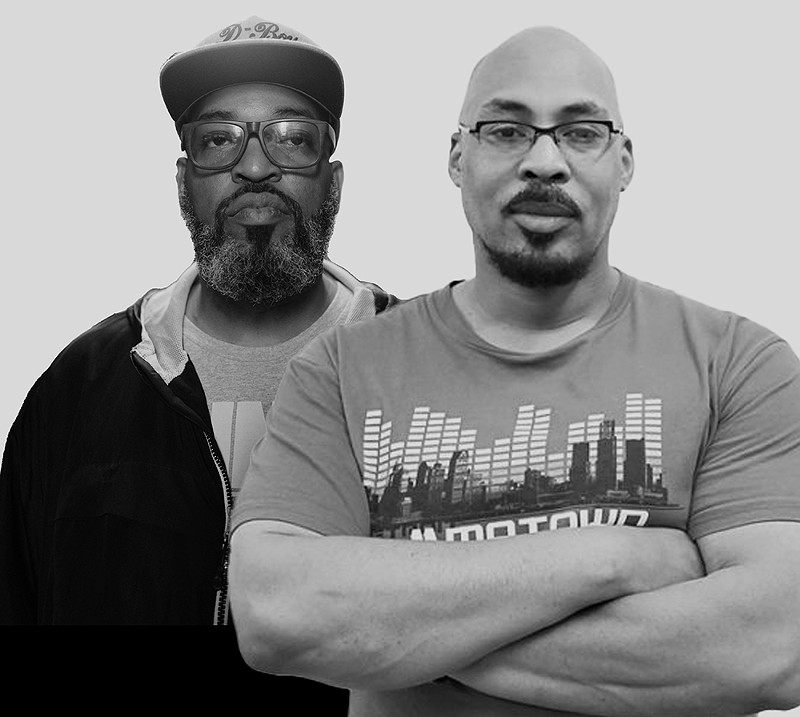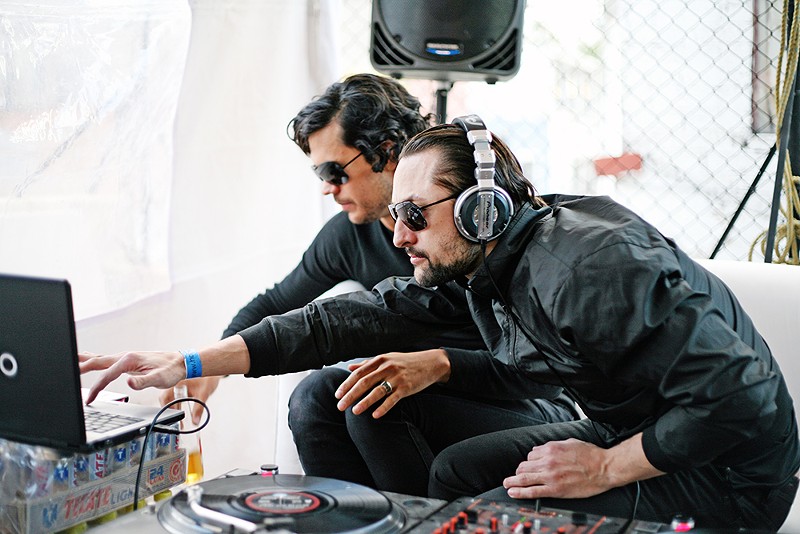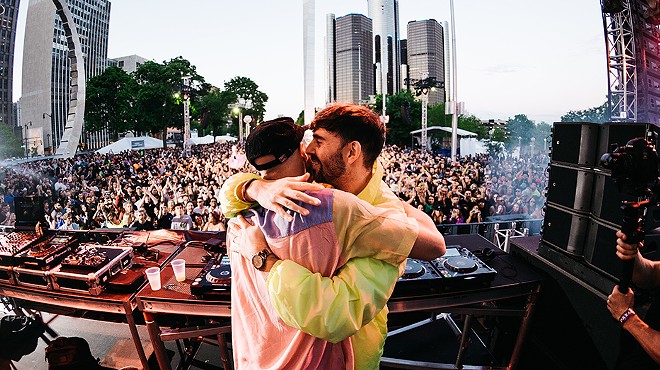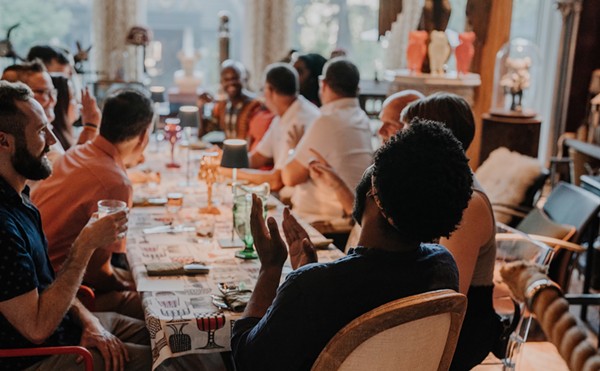
This is clearly the Movement festival’s year of the back-to-back.
The back-to-back DJ set — hereafter, b2b — has been around as long as DJing itself. But only in the past decade has that specific term come into widespread use. It’s not the only term floating about — a number of promoters are now using “x,” instead. But the concept hasn’t budged, and “b2b” itself has yet to wear out its welcome.
This year, Hart Plaza’s stages will host six b2b sets. In chronological order: on Saturday, Rick Wilhite b2b Andrés (Stargate Stage, 3:30 p.m.); Eris Drew b2b Octo Octa (Pyramid Stage, 5 p.m.); and Audion b2b Ryan Elliott (Underground Stage, 6 p.m.). On Sunday, Carl Craig b2b James Murphy (Waterfront Stage, 10:30 p.m.). And on Monday, Vincent Patricola b2b Jesse Cory (Detroit Stage, 3 p.m.) and Goldie b2b LTJ Bukem (Waterfront Stage, 9 p.m.).
That’s not counting the three-way DJ roundelay of Jorissen b3b Loren b3b Mathias (Saturday, Pyramid Stage, 2 p.m.); nor does it include Nancy Whang and Pat Mahoney, a readymade duo (Sunday, Waterfront Stage, 4:30 p.m.), nor Soul Clap w/Amp Fiddler, a live collaboration, not a b2b DJ set (Sunday, Waterfront Stage, 7:30 p.m.).
And that also doesn’t count the number of after-parties and side events featuring b2bs — many, if not most of them.
The b2b denotes not only that two DJs are playing together, but that they usually don’t. That’s becoming less and less the case with some DJs who are frequently paired up. At Movement, this includes Drew and Octa, who frequently play back-to-back — they’re a couple, but not a duo, if you follow — while Rick Wilhite and Andrés have played the Sampled Detroit party together during Movement weekend each of the last few years, as they noted during our interview. And, of course, the dons of ’90s drum and bass, Londoners Goldie and LTJ Bukem, have played b2b together a few times as well.
To get some insight on the art, soul, and mechanics of the b2b, Metro Times interviewed five of the DJs playing in that framework at Movement 2022: Andrés, Wilhite, Goldie, Bukem, and Craig. (The latter also plays solo on Saturday at Stargate Stage, 9:30 p.m.) All were done separately, apart from Andrés and Wilhite, who spoke together at the former’s house. All are veterans with stories galore from the DJ trenches. All agreed that the b2b format gave them plenty of leeway. Happily, so did our questions.
Metro Times: How did you and your Movement b2b partner first meet?
Goldie: Rage [the London club where drum and bass germinated]. You have to understand, Rage was the equivalent of going to the Roxy or Studio 54 for some people.
LTJ Bukem: I remember spending quite a bit of time with Goldie in his Camden flat when he wrote “Terminator,” and immediately thought, “Here’s someone that sees things differently to everyone else. Always creatively thinking outside the box, pushing ideas to their limit.”
Goldie: I have the most admiration for Danny. When I met him, I was like, “Shit, he’s mixed-race like me.” We’re very similar. We’re very lone-wolfish. We don’t mix with a lot of people. We do our own thing. And we were born a day apart. He’s the 18th and I’m the 19th. I think I’m a year older, maybe. Both Virgos.
Carl Craig: I came by to [James Murphy’s] DFA office in Manhattan some years after I had first heard the one where he talked about Juan Atkins [“Losing My Edge,” 2002]. Once I started to hear a lot more of the DFA stuff, as well as the LCD Soundsystem stuff, I was as charmed as anybody else.
Andrés: Buy-Rite Music.
Rick Wilhite: Seven Mile Road.
Andrés: I worked there while I was in high school. And that’s where I met everybody. Kenny [Dixon Jr.] vouched for me to get a job in there. I was just wide-eyed. I was a super B-boy hip-hop guy, as far as my foundation — I never knew that, later on, I would be making dance music. There was stuff that I would learn from these guys, like, “What’s the difference between techno and house? And what’s good?” I learned all that from my job.
Metro Times: Do you remember the first time you played a b2b DJ set? What were the circumstances — a professional gig or something more casual?
Carl Craig: My first back-to-back? I can’t really remember, to tell you the truth. But the reason why I know it was professional is because we weren’t doing back-to-backs when I was starting out professionally, which was in 1991.
LTJ Bukem: Back-to-backs were quite rare in the ’90s as opposed to now being a mainstay in the drum and bass world. I first played a b2b with Peshay in the mid-’90s. We were booked to do it.
Metro Times: Have you and your Movement partner played back-to-back together before?
Rick Wilhite: Most definitely, yeah.
Andrés: I think it started at the Sampled Detroit party, right?
Rick Wilhite: We did it [in] Amsterdam. We did it at the Mahogani party.
Andrés: I don’t think it really dawned on us that it was a special thing until the Sampled Detroit party. I guess they kept booking us; we play every year. Then Movement asked us, and I think it’s because of that.
Goldie: We did some back-to-backs in Liverpool going back awhile, pre-COVID. It’s always a pleasure, because you know he’s gonna pull some stuff out. With Danny, I feel genre-less.
LTJ Bukem: With drum and bass, you have to realize, it’s a music formed from all styles of music. So put together two guys like Goldie and myself with the history we have, the set will go places it wouldn’t go in a solo set from either of us.
Carl Craig: When you play back-to-back, it can be either a partnership or a battle. The DJ battle goes back to Kool Herc and Africa Bambaataa, when they were throwing parties in the street, when they would plug into the light poles in order to get juice in order to run their sound systems. So, that logic is always there.
“When you play back-to-back, it can be either a partnership or a battle.”
tweet this
With house music and techno and the newer breed of DJs, when you see somebody like Luciano and Ricardo Villalobos playing together, it’s not a battle. It’s a friendship, but it’s almost like band members, like dueling guitar players. You’re trying to outdo the other person, but it’s still a partnership with what’s happening. That’s how I look at whenever I do a back-to-back, with Luciano or with Stacey Pullen: it’s a friendship, it’s a discussion.
Andrés: I always tell people about watching us play: You never know what the next record is gonna be.
Rick Wilhite: Right.
Andrés: We’re both competitive in nature. We want to have one up on each other. It makes for an interesting combination. As long as we can mix it and make it work.
Rick Wilhite: Have you noticed the secret to the back-to-back situation?
Everybody is like, it’s like a new thing right now. But everybody can’t do that shit, man. It’s a method to that shit. Because we just happen to have that je ne sais quoi between each other; like, whatever you come with, I got something for that shit.
Andrés: And we’re so different from each other at the same time, but that’s what makes it interesting. I used to tease Rick and be like, “Hey, you got every record, man, but you don’t share.” [Wilhite laughs.] It’s always an educational thing for me, because I’m still learning, really. I’m very informational, very well groomed, but I’m still learning stuff. So, you’ve got to communicate.
The thing about our sets is, you’re getting a lot of culture, a lot of information, by way of music. It’s definitely a school-is-in thing. There’s never any script. Because Rick knows my cultural background, so he knows where he can go, and he knows where I can go, and then he wants to let me know that “I know about this dope-ass Latin record.” [Rick laughs.] It becomes a whole thing of that — as well as wanting to please the crowd, we’re letting each other know. We’re pretty much showing off our records to each other, but it’s in the form of a set.
Metro Times: How would you describe each other’s style?
Rick Wilhite: You can call mine ‘Malcolm X: unknown.’ [All laugh.]
Andrés: I always learn something from what he plays. I’ve got to stress that you technically never know what the next record is going to be, and that’s fun. I always feel like I come home learning about ten, fifteen, twenty [records]. I probably can’t remember half the shit, but I learned something, and that says a lot. And you just don’t know, so I’ve got to prepare. I’ve got to make sure I have a little bit of everything to counter — or to set it off. He said Malcolm X, I say freedom — that’s close enough. [laughs]
Sometimes I’ll be trying to keep it [his turn on the decks]: “I want to show what I got.” And he’ll go changing it — and I’m like, “Shit, now you want to go into hip-hop, or go into a Latin record. Now I’ve got to try to bring it back, because I wanted to play this before he went there.”
Rick Wilhite: You can’t just put me up there with just anybody.
Metro Times: Who’s playing first?
Carl Craig: [instantly] What’s on second? It’s just whoever feels they have something to say first.
Goldie: Whoever feels it, man. You want it, Danny? You’re more than welcome, dude. Do whatever you want. I’m always about it. Listen, Danny wants to take the floor, he’s more than welcome. I’m like, “Take the floor, baby. I’ve got plenty of music.”
Stay connected with Detroit Metro Times. Subscribe to our newsletters, and follow us on Google News, Apple News, Twitter, Facebook, Instagram, Reddit, or TikTok.







